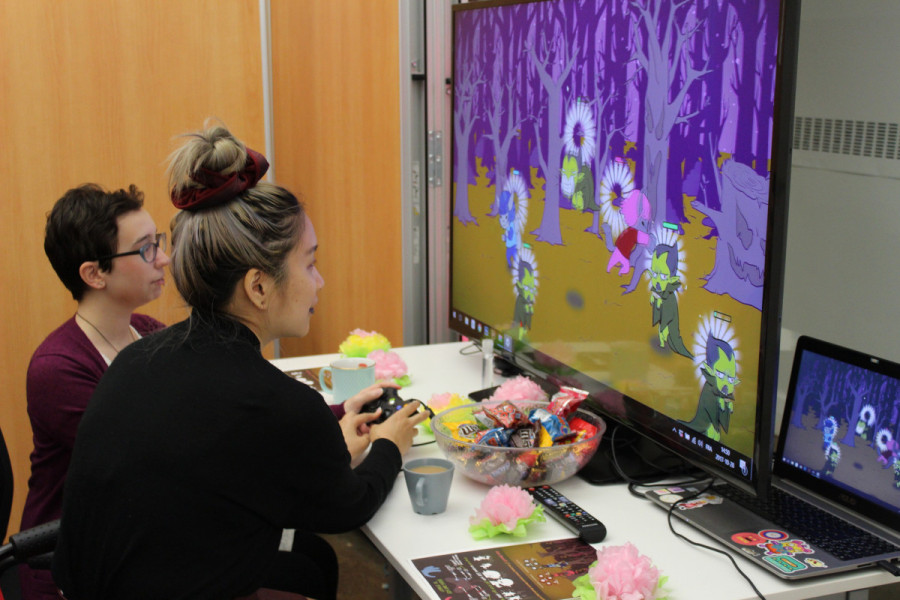Pixelles: promoting gender diversity in a male-centric video game industry
Montreal-based organization seeks to provide tech knowledge and resources to minorities during ongoing mass layoffs
Over a decade ago, Rebecca Cohen-Palacios was asked by a group of aspiring video game writers to run a “make your first game” course for women. She made sure to leave room for six applicants to participate in the course. However, when she later checked the breadth of the applications, she found that over 100 people were interested in taking part.
“That kind of demonstrated a whole need to support women in game development,” said Cohen-Palacios. Thus, a unique technology industry initiative called Pixelles was created.
As the director and co-founder of the Montreal-based non-profit organization, Cohen-Palacios has been aiming to promote gender diversity in the tech and gaming industry over the last decade.
Pixelles is entirely run by volunteer effort. Volunteers help coordinate and teach workshops and courses both in-person and virtually, on topics such as video game writing, video game Indigeneity, queer representation in the industry and beyond. The organization also offers a scholarship program, where winners get the chance to attend renowned events such as the Game Developers Conference, which takes place in the US annually.
The organization’s services, while often open to everyone, prioritize women.
According to Cohen-Palacios, Pixelles was created to support women in the gaming industry who are brand new to it, mid-career, or even advanced in their knowledge and experience. The organization is focused on two branches: people who are currently in the gaming industry and need support through resources—such as career development workshops and conferences—and people who aspire to make their own video games.
While Pixelles is primarily geared towards women, Cohen-Palacios noted the organization tries to offer support to other minorities such as transgender and non-binary people.
“[Trans people] need support as well, and if we’re [already] holding the door open, we might as well hold it open for others,” she said.
The video game industry is well known to be one of the most heavily male-dominated industries today. According to a UNICEF report from November 2023, roughly half of the gaming population worldwide are women, and yet less than a quarter of the gaming industry’s workforce are women.
Currently, Pixelles is holding its yearly Game Writing Program, which began in February and will run until April. It is one of Pixelles most popular courses, and within minutes of registration opening, Cohen-Palacios said it was full.
According to the program’s co-coordinator Kylie Szymesko, the game writing program is a free, asynchronous, self-guided course that gives participants access to specifically curated information and resources on video game writing gathered by the program’s writers group.
Szymesko added that while the course is not graded, bi-weekly homework assignments are given out regularly in relation to the main takeaways from the topics being taught.
Broadly, Szymesko and her co-coordinator aim to help participants answer the question: what does it take to write a video game, and what really makes it different from other forms of writing?
“You get out of this [program] what you put into it,” said Szymesko. She explained that the program was made to give participants a sense of what entry-level jobs in the gaming industry might look like.
“This is what junior writers in a larger studio are doing,” said Szymesko. “Or if you’re going to get an internship somewhere, these are some of the tasks that we know are a little more common.”
Szymesko herself is an alumnus of the very first Game Writing Program, which took place in 2015. A year later, she began working and volunteering at the organization.
Unfortunately, in the current context of an industry that is rapidly laying off workers with the emergence of more advanced artificial intelligence, Syzmesko said that running the Game Writing Program has become more challenging:
“It’s a little brutal, I’ll be honest. You see all these people who [know] this is their passion, this is what they want to do, and we’re trying to help them get their foot in the door [but] we know that we can’t make promises that anything’s going to lead from here,” Syzmesko said. “It’s a lot of trying to keep people’s hopes up, while also not putting out expectations that there are jobs out there for everyone.”
In Montreal alone, large tech companies such as Ubisoft and Behaviour Interactive have announced over 100 layoffs within the past few months. This issue, paired with the ongoing issue of the gender gap in the technology industry, makes the existence of an organization like Pixelles challenging yet necessary.
“[This work] is really fulfilling but also really hard,” said Cohen-Palacios. “There is just so much work to do out there, and the problem of the gender gap is a really huge [one] and there is no one solution to fit all problems, especially at the systemic level.”
Even still, Cohen-Palacios has noticed the difference Pixelles is making in the community bit by bit.
“The change that we do see, it’s really rewarding,” said Cohen-Palacios. She explained that one of her co-directors attributes this change to what she calls the “ripple effect”—the way Pixelles has impacted one person ripples out into larger changes among different people in the industry. She added that the change she sees in the domain of tech and video games can be as simple as a program alumnus getting their first game industry job, then becoming a manager, then helping someone else get into the industry themselves. “Even though it feels like you’re doing a very small action, the impact is much larger,” said Cohen-Palacios.
“Pixelles has always been a bit of a beacon, I know for myself and a few other people who’ve been involved in it,” Szymesko said. “There’s this great comfort that Pixelles offers of not giving up on the industry.”
This article originally appeared in Volume 44, Issue 12, published March 19, 2024.




_600_375_90_s_c1.jpg)


